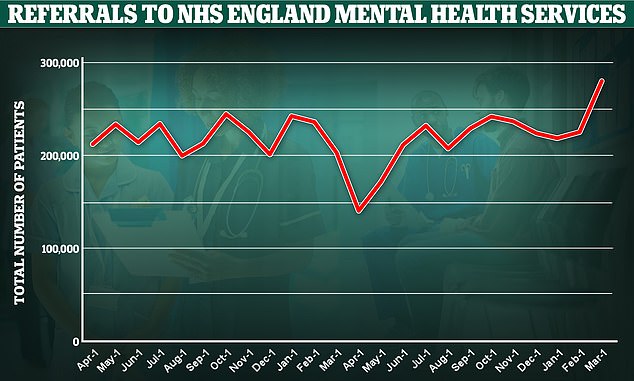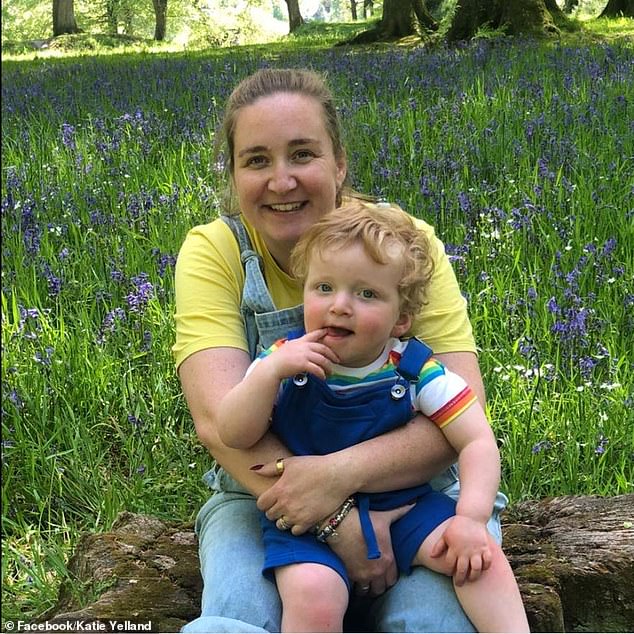Mental health referrals in the UK have spiked by nearly a fifth on the back of the coronavirus crisis, analysis suggests.
Around 300,000 Britons were recommended for treatment in March this year, a rise of 18 per cent compared to February 2020 – a month before the first lockdown.
Referrals more than doubled in hardest-hit areas in England, including Leeds, Redbridge and Greater Preston, according to the analysis by the BBC.
Urgent referrals to crisis care teams – which include suicidal patients – have also risen 15 per cent in the same time period, nationally.
However, the impact of the pandemic on mental health referrals in England seems less clear when looking at the entire year. There were roughly 3million in the 12 months to March 2021, about the same as the previous year.
Charities fear patients have suffered in silence and put off coming forward for care during the pandemic, and warn there could be huge increases in referrals to come.
Despite the spike in referrals this March, the number of patients actually receiving care was 9 per cent below pre-pandemic levels.
Limited capacity due to social distancing is said to be partly to blame, as well as reduced services during lockdowns.
One suicidal mother who tried to take her own life last spring said she felt ‘abandoned’ by the NHS when it shut down services to focus on Covid in the first wave.
Experts have long warned that a silent mental health epidemic has been brewing amid the pandemic, particularly in the young.
Separate data last month showed twice as many children and young adults were referred to mental health services in England last year as cases hit a record high.

Around 300,000 Britons were recommended for treatment in March this year, a rise of 18 per cent compared to February 2020 – a month before the first lockdown

Katie Yelland, 30, tried to take her own life weeks before the first lockdown after suffering from post-natal depression. She said she felt abandoned by the NHS’ mental health services and had to rely on her family to support her through her depression
Analysis of NHS Digital data shows that the biggest increase in all mental health referrals was in Leeds, one of the most deprived areas in the UK.
A total of 7,385 adults were referred to mental health services this March, which was more than double the number in February 2020 (3,385).
It was followed by the London borough Redbridge, where there was a similar rise. It saw 2,510 referrals in March compared to 1,180 last February.
Referrals in Preston, Lancashire, doubled to 1,905 in the same time period.
There were also significant rises in North East Lincolnshire (61 per cent), Morecambe (55 per cent), Chorley and South Ribble (52 per cent), Rotherham (52 per cent) and Fylde and Wyre (51 per cent).
Suicidal mother ‘abandoned’ by NHS when mental health shut down in first lockdown
Katie Yelland, 30, tried to take her own life weeks before the first lockdown after suffering from post-natal depression following the birth of her son in August 2019.
She said she felt abandoned by the NHS’ mental health services and had to rely on her family to support her through her depression because services were paused to focus on Covid.
Describing how her treatment stopped after lockdown was imposed, Ms Yelland told the BBC: ‘Everything just kind of built up and caved in on me. Access to the services just wasn’t there.
‘I was just abandoned for a good number of weeks, while the new NHS system got into place.
‘Once that system was finally in place, it was then an absolute minefield trying to use it and professionals didn’t know how to use it.
‘I was really isolated and I felt really concerned. I was really confused and became very reliant on my family. It opened their eyes to how much I was struggling.
‘They’ve just seen me happy and bubbly. They hadn’t seen the internal struggle that that was going on.’
Before the pandemic, Ms Yelland saw a psychiatric nurse and the perinatal mental health team on a weekly basis.
She added: ‘The care from the perinatal team just completely stopped. There was nothing, just here one day, gone the next, and with the community team there was nothing.
‘I was left for a good number of weeks, with no help, just getting worse and worse.’
Advertisement
While year-on-year comparisons of referrals are less stark, there are concerns that people have put off coming forward until now and that there could be further spikes.
Urgent referrals – which include patients at risk of suicide – spiked to 15,485 across England this March, a rise of 16 per cent compared to last February (12,870).
Charities warned that they were braced for leaps in referrals now that Covid has been largely reduced and people feel more comfortable to seek support.
But MINDS’s head of health policy Geoff Heyes told the BBC: ‘Had those people been able to get support earlier, be that through community mental health services, through talking therapies in their community, they may well have not got that unwell.’
Rethink said it had seen a ‘huge surge’ in the number of people looking for help.
The charity’s deputy chief executive Brian Dow added: ‘If this increase in referrals is sustained, it has the potential to place the system under real pressure.
‘We’re already seeing signs of stretched services across the country, with people being sent miles away for care because there aren’t beds locally.’
‘We also saw a worrying increase in the number of people doing searches for things such as PTSD.
‘We know that, for example, lots of people in frontline healthcare delivery did experience very serious problems, and there seems to be an acute rise in the number of people experiencing PTSD.’
Children, too, appear to be bearing the brunt of the negative mental health effects of the pandemic and lockdowns.
Data shows there was a record high for referrals to child and adolescent mental health services in England in March 2021.
There were a total of 65,533 across the country, more than double the number in March 2020 and 68 per cent higher than March 2019.
Between 2020 and 2021, the data reveals there were 527,339 referrals in total, compared with 397,822 the previous 12 months – a 33 per cent year-on-year increase.
Emergency referrals for under-18s were 62 per cent higher in March 2021 than the previous year.
Katie Yelland, 30, tried to take her own life weeks before the first lockdown after suffering from post-natal depression following the birth of her son in August 2019.
She said she felt abandoned by the NHS’ mental health services and had to rely on her family to support her through her depression because services were paused to focus on Covid.
Describing how her treatment stopped after lockdown was imposed, Ms Yelland told the BBC: ‘Everything just kind of built up and caved in on me. Access to the services just wasn’t there.
‘I was just abandoned for a good number of weeks, while the new NHS system got into place.
‘Once that system was finally in place, it was then an absolute minefield trying to use it and professionals didn’t know how to use it.
‘I was really isolated and I felt really concerned. I was really confused and became very reliant on my family. It opened their eyes to how much I was struggling.
‘They’ve just seen me happy and bubbly. They hadn’t seen the internal struggle that that was going on.’
Before the pandemic, Ms Yelland saw a psychiatric nurse and the perinatal mental health team on a weekly basis.
She added: ‘The care from the perinatal team just completely stopped. There was nothing, just here one day, gone the next, and with the community team there was nothing.
‘I was left for a good number of weeks, with no help, just getting worse and worse.’
The UK government says it plans to expand and transform mental health services with £2.3billion a year by 2023-24.
Source link : https://www.dailymail.co.uk/news/article-9904443/Mental-health-referrals-spiked-fifth-lockdowns-figures-reveal.html











